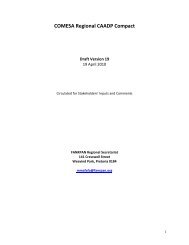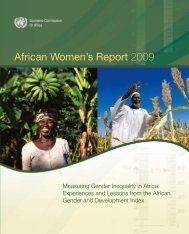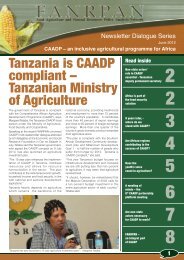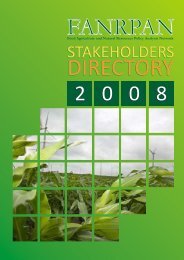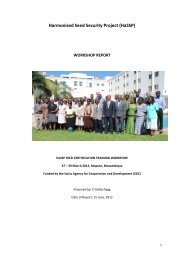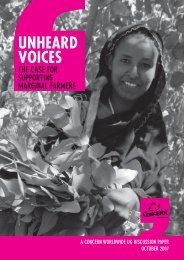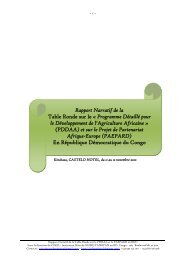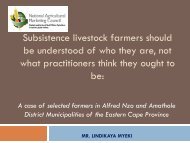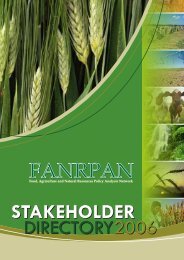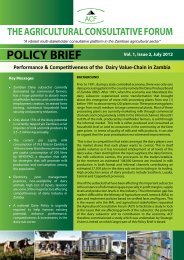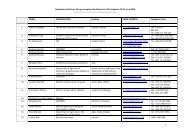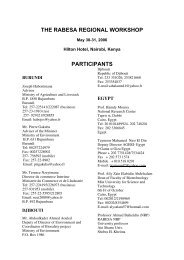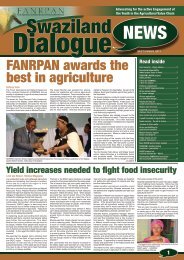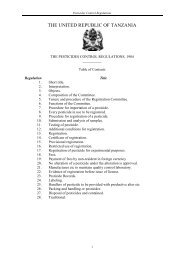In both Mali and Guinea, the interviewees reported that there are many CBOs in operation.In Mali, 55 per cent of the interviewees in Segou are members of a CBO, and 76 per cent inKolokany. In Guinea, 68 per cent of the respondents said they are member of a CBO. Eighteenper cent of people in Mali and 28 per cent in Guinea have not joined a CBO, seemingly due tolack of interest or lack of in<strong>for</strong>mation. In both countries respondents were well aware (over 90per cent of the sample) of the conditions required to obtain <strong>IFAD</strong> project funding <strong>for</strong>community investments.In Cape Verde, the study suggests that few CBOs have been established, on either a <strong>for</strong>malor in<strong>for</strong>mal basis 49 , groups of poor farmers are rather organized by the CSO of public utilityoperating in their respective island.Despite some shortcomings, the investigations have obtained people’s opinions on theimpact of <strong>IFAD</strong> projects at community level, and ascertained <strong>IFAD</strong> CDD projects’ capacity tosupport community members’ ability to get organized, to decide on and undertake activitiesaimed at improving their situation, whilst including a significant participation of women andyoung people in shaping community <strong>decision</strong>s. The share of people not in agreement with thedifferent project interventions, or with specific community <strong>decision</strong>s, ranging from 20 to 30per cent of the total sample interviewed, confirms the emergence, after a number of years ofproject operations, of a lively setting in the project areas, that may provide in due course achange in the leadership of the public institutions responsible <strong>for</strong> the local welfare.Table B-3Participation in <strong>decision</strong> making in the <strong>Community</strong> Based Organizations (CBOs) acting <strong>for</strong>the exclusive benefit of their membersCountry Mauritania Mali Guinea Conakry Cape VerdePer cent of total sample interviewed(two figures show different results in different sampled areas)Private organizations of local partners (CBO):Are there CBOs in your community? 100 100 96 12Which is the most important CBO activity MICOs several several n.a.funded by the project in your area?In<strong>for</strong>med of the objectives of the CBOs 57 - 61 n.a.supported by the <strong>IFAD</strong> project?How many of you are members 75 55 – 76 68 n.a.of a CBO?If not a member, why?- lack of interest, lack of in<strong>for</strong>mation, 18 28 n.a.no replyDo members’ meetings take no yes yesplace regularly?Aware of the conditions required n.a. 91 90 72-30to join <strong>IFAD</strong> project funding49 May be due to the expression used by the interviewers (socio-economic organization) which may well have been misunderstoodby the respondents.95
Selected documentsPapers and reports (other than <strong>IFAD</strong> project documents)1. Alatas, V.; Pritchett, L.; Wetterberg, A. 2002. “Voice Lessons: Local Government Organizations,Social Organizations, and the Quality of Local Governance”. World Bank Policy researchWorking Paper 2981.2. AQUADEV. 2002. « Décentralisation et Coopération Décentralisée ». Actes du séminaireinternational de Gorée (Senegal).3. Bako-Arifari, N. ; Dicko, A.B.; M. Doevenspeck, M. ; Saou, B.W. ; Singer, U. 2004. Financer laDécentralisation Rurale. Taxes et Impôts à l’échelle locale au Bénin, Burkina Faso et Mali.Amsterdam, Royal Tropical Institute.4. Bingswanger, H.; Swaminathan, A. 2002. “Scaling up <strong>Community</strong>-Driven Development”.Draft WB document.5. Bonnet, P.; Losch, B.; Vliet, G. Van G. 2005. Setting up a management of public policies withmultifunctional purpose. The case of developing countries. CIRAD.6. Das Gupta, M. ; Grandvoinnet, H.; M. Romani, M. 2003. Fostering <strong>Community</strong>-DrivenDevelopment: What Role <strong>for</strong> the State? World Bank Policy Research Working Paper 2969.7. Donovan, A.; Smart, M.; Moreno-Torres, M.; Ole Kiso, J.; Zachariah, G. 2005. Countries at riskof Instability: Risk Factors and Dynamics of Instability.8. E-conference on CDD organized by <strong>IFAD</strong> from June 2005 to March 2006: several notes.9. FAO Investment Centre. 2003. “Client Survey: 51 simple qualitative in<strong>for</strong>mation to assessproject impact”. Memo by A. Carloni.10. FAO Investment Centre. 2003. “Scaling Up Issues and Option”. Draft paper. Rome.11. FAO. 2002. “Draft Decentralization Manual”. Rome.12. <strong>IFAD</strong>. “A summary of <strong>IFAD</strong>’s Strategic Framework 2007-2010”. Rome.13. <strong>IFAD</strong>. 2003. “Draft proceeding on the Consultation and Workshop on the Rule inInternational Assistance in Conflict-Affected Countries”. Rome14. <strong>IFAD</strong>. 1999. “Evolving Approach to Decentralization in Western Africa”. Rome15. <strong>IFAD</strong>. 2004. “Independent external evaluation of <strong>IFAD</strong>: Country Visits Findings, MajorThemes and Issues”. Rome.16. <strong>IFAD</strong>. 2003. « Decision Tools <strong>for</strong> Rural Finance”. Rome.17. <strong>IFAD</strong>. 2008. « Enquête sur les partenaires de projets CDD- FIDA (Cap Vert, Guinée-Conakry,Mali, Mauritanie) ». Draft Report.18. <strong>IFAD</strong>. 2004. “Review of Project Design, Policy and Per<strong>for</strong>mance”. In<strong>for</strong>mal Workshop to ReviewLessons Learned on <strong>Community</strong>-Driven Development in Western and Central Africa.19. <strong>IFAD</strong>. 2004. “An Introduction to the Debate”. In<strong>for</strong>mal Workshop to Review Lessons Learned on<strong>Community</strong>-Driven Development in Western and Central Africa.20. <strong>IFAD</strong>. “Local Development, Decentralization, and Governance”.21. <strong>IFAD</strong>. 2006. “Strategic Framework 2007-2010: Enabling the <strong>rural</strong> poor to overcome poverty”.22. Krishna, Anirudh. 2004. “Partnership between Elected Local Governments and <strong>Community</strong>basedOrganizations: Exploring the Scope <strong>for</strong> Synergies”. Social Development Papers.23. Kumar, N. 2003. “<strong>Community</strong>-Driven Development: Lessons from the Sahel: an AnalyticalReview”. World Bank Operations Evaluation Department.24. Manor, J. 2004. “User Committees: a Potentially Damaging Second Wave ofDecentralization?” European Journal of Development Research.96



